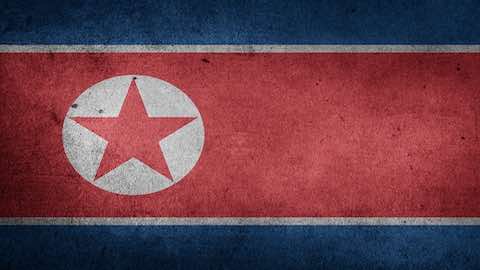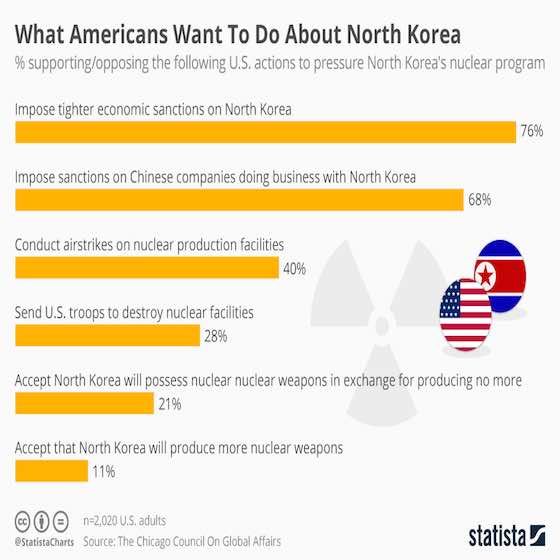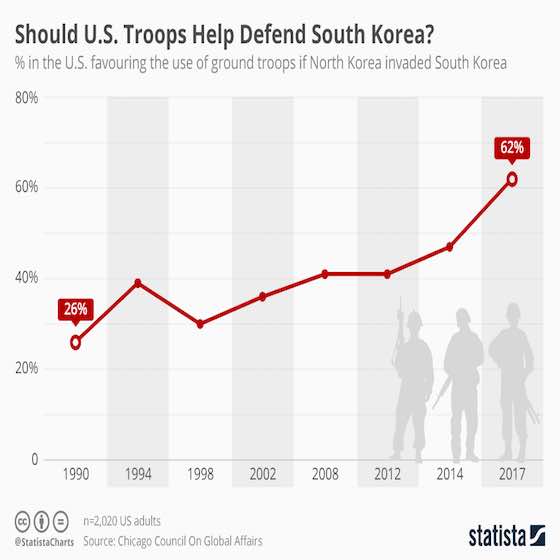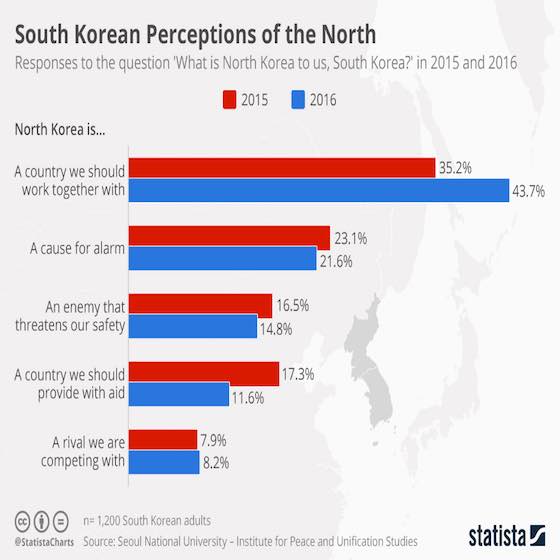- MENU
- HOME
- SEARCH
- WORLD
- MAIN
- AFRICA
- ASIA
- BALKANS
- EUROPE
- LATIN AMERICA
- MIDDLE EAST
- United Kingdom
- United States
- Argentina
- Australia
- Austria
- Benelux
- Brazil
- Canada
- China
- France
- Germany
- Greece
- Hungary
- India
- Indonesia
- Ireland
- Israel
- Italy
- Japan
- Korea
- Mexico
- New Zealand
- Pakistan
- Philippines
- Poland
- Russia
- South Africa
- Spain
- Taiwan
- Turkey
- USA
- BUSINESS
- WEALTH
- STOCKS
- TECH
- HEALTH
- LIFESTYLE
- ENTERTAINMENT
- SPORTS
- RSS

North Korea, officially known as the Democratic People's Republic of Korea (DPRK), is a secretive and isolated country located in East Asia on the northern part of the Korean Peninsula.
Key Facts And Figures About North Korea
Geography
Capital: Pyongyang
Area: Approximately 120,540 square kilometers (46,541 square miles)
Borders: North Korea shares land borders with China to the northwest and Russia to the northeast. To the south, it is separated from South Korea by the Korean Demilitarized Zone (DMZ).
Population
The population of North Korea is estimated to be around 25 million people.
Political System
North Korea is a single-party state led by the Workers' Party of Korea (WPK).
The country's leadership is centralized around the Kim dynasty. As of my last update, Kim Jong-un was the Supreme Leader of North Korea, following his father Kim Jong-il and his grandfather Kim Il-sung.
Economy
North Korea's economy is characterized by state control and central planning.
The country has a heavy emphasis on industry and military production, with agriculture playing a significant role in domestic food production.
Economic sanctions and isolation have severely limited North Korea's international trade and economic growth.
Military
North Korea maintains one of the largest standing armies in the world, with a focus on military readiness.
The country has conducted several nuclear weapons tests and missile launches, leading to international concerns.
International Relations
North Korea's foreign relations are often characterized by isolation and tensions with many countries, including South Korea, the United States, Japan, and the international community at large.
The country has faced multiple rounds of United Nations sanctions due to its nuclear program and human rights abuses.
Life in North Korea
Information about daily life in North Korea is limited due to the country's isolation and strict control over media and communications.
The state-controlled media promotes government propaganda and ideology.
Human rights organizations have raised concerns about the lack of political freedoms and human rights abuses in North Korea.
Cultural and Historical Significance
North Korea has a rich cultural heritage, including traditional music, dance, and art forms.
The country celebrates various national holidays and events, including the birthdays of the Kim dynasty leaders.
Language
The official language is Korean.
Religion
While the government promotes atheism, there are some religious practices in North Korea, including Shamanism, Buddhism, and Chondoism.
The state also propagates the ideology of Juche, often described as self-reliance or self-determination, as a guiding philosophy.
Education
Education is highly controlled by the state, and the curriculum emphasizes loyalty to the government and the Kim dynasty.
There are compulsory military education programs for students.
Media and Information
All media outlets in North Korea are state-controlled, and there is no independent press.
Access to foreign media, including the internet and international news, is heavily restricted.
Human Rights Concerns
North Korea has faced widespread international criticism for its human rights record, including reports of political imprisonment, forced labor camps, and restrictions on freedom of expression.
Healthcare
Healthcare in North Korea faces numerous challenges, including a lack of resources, outdated medical equipment, and limited access to modern healthcare.
Food Security
North Korea has faced periodic food shortages and famines due to a combination of factors, including weather events, economic difficulties, and international sanctions.
Transportation
The country has a limited and outdated transportation infrastructure. Roads and railways connect major cities, but travel within North Korea can be challenging.
Tourism
North Korea allows a limited number of tourists to visit, but travel is tightly controlled, and tourists are closely supervised by government-appointed guides.
Korean War
The Korean War (1950-1953) resulted in the division of the Korean Peninsula into North and South Korea. An armistice was signed in 1953, but a peace treaty was never officially concluded, leaving the two Koreas technically at war.
Economic Sanctions
North Korea has faced a series of economic sanctions imposed by the United Nations and individual countries due to its nuclear weapons program and other international concerns.
Kim Jong-un
Kim Jong-un is the Supreme Leader of North Korea, officially known as the Democratic People's Republic of Korea (DPRK).
Full Name: Kim Jong-un (The family name is Kim, and the given name is Jong-un.)
Date of Birth: Kim Jong-un's exact date of birth is not publicly confirmed but is estimated to be on January 8, 1984, or 1983.
Family Background
Kim Jong-un is a member of the ruling Kim dynasty, which has led North Korea since its establishment.
He is the son of Kim Jong-il, the former Supreme Leader of North Korea, and Ko Yong-hui.
Kim Jong-un is the grandson of Kim Il-sung, the founding leader of North Korea.
Assumption of Power
Kim Jong-un assumed power following the death of his father, Kim Jong-il, in December 2011.
His rise to power was marked by a period of consolidation and political purges within the North Korean leadership.
Political Titles
Kim Jong-un holds several key political titles, including Supreme Leader of North Korea, Chairman of the Workers' Party of Korea (WPK), Chairman of the State Affairs Commission (the country's top decision-making body), and Supreme Commander of the Korean People's Army.
Leadership Style
Kim Jong-un's leadership style has been characterized by a strong focus on maintaining control over the country, its military, and its political apparatus.
His leadership has been marked by an emphasis on the military, nuclear weapons development, and a focus on the ideology of Juche, often described as self-reliance.
International Relations
Kim Jong-un has engaged in a series of high-profile summits and diplomatic initiatives with world leaders, including meetings with South Korean President Moon Jae-in, U.S. President Donald Trump, and Chinese President Xi Jinping.
North Korea's nuclear weapons program and its relationship with the international community have been significant aspects of his leadership.
Secrecy and Control
North Korea under Kim Jong-un is known for its strict control over information and its secretive nature.
Information about the internal workings of the North Korean government and society is limited, and access to the country is tightly controlled.
What Americans Want To Do About North Korea
By Niall McCarthy (Statista)
Tensions between North Korea and the United States have risen sharply with Donald Trump warning the North Korea's regime that any threat to the United States will be met with "fire and fury". North Korea apparently responded that it is considering attacking Guam, a major Pacific hub for the U.S. military and its strategic bomber force in particular.
When it comes to solving the escalating crisis, the majority of Americans back sanctions to curb North Korea's nuclear program. The Chicago Council on Global Affairs found that 76 percent of Americans want to impose tighter sanctions on Pyongyang while 68 percent also want to see sanctions imposed on Chinese companies doing business with North Korea.
Given the real threat of retaliation and escalation, military action is a far less popular option. 40 percent of Americans would back airstrikes against the North's nuclear infrastructure and 28 percent would support ground troops destroying its production facilities.
One thing is certain: Americans won't accept a nuclear-armed North Korea. 21 percent say they will accept Pyongyang possessing nuclear weapons in exchange for halting production while only 11 percent accept North Korea producing more weapons.
This chart shows the share of Americans supporting/opposing the following U.S. actions to pressure North Korea's nuclear program.

What Americans Want To Do About North Korea
Should U.S. Troops Help Defend South Korea?
By Niall McCarthy (Statista)
As the war of words between North Korean leader Kim Jong-un and U.S. President Donald Trump ratcheted up tensions on the Korean peninsula, how does the U.S. public feel about the prospect of military confict between the two Koreas? According to a poll by The Chicago Council on Global Affairs, only a quarter of Americans favored using U.S. ground troops to help South Korea repel an invasion by the North back in 1990.
Since then, support for assisting Seoul with ground troops in the case of invasion has climbed steadily, reaching an all-time high of 62 percent this year. The U.S has a permanent military presence in South Korea with approximately 23,500 service members currently deployed there.
This chart shows the share in the U.S. favouring the use of ground troops if North Korea invaded South Korea.

Should U.S. Troops Help Defend South Korea?
South Korean Perceptions of North Korea
By Martin Armstrong (Statista)
According to news media in the region, South Korean diplomat Kang Kyung-wha spoke face-to-face with her North Korean counterpart, Ri Yong Ho, marking the first high-level contact since President Moon Jae-in took to power. The liberal politician has made it a clear priority to improve relations between the two countries, saying at the start of his presidency, "I will urgently try to solve the security crisis ... If needed, I will fly straight to Washington. I will go to Beijing and Tokyo and, if the conditions are right, to Pyongyang also." The latest development occurred at the ASEAN Regional Forum in Manila.
As our infographic shows, Moon's sentiment would seem to also be matched by a large proportion of the South Korean public. In the latest of a series of annual surveys by the Institute for Peace and Unification Studies at Seoul National University, 43.7 percent said that the North is a country they should work together with - an increase of 8.5 percentage points since 2015. The share seeing their northern neighbor as an enemy decreased in this time, from 16.5 percent to 14.8 percent.

South Korean Perceptions of North Korea
WORLD | AFRICA | ASIA | EUROPE | LATIN AMERICA | MIDDLE EAST | UNITED STATES | ECONOMICS | EDUCATION | ENVIRONMENT | FOREIGN POLICY | POLITICS
"North Korea Facts and Figures"